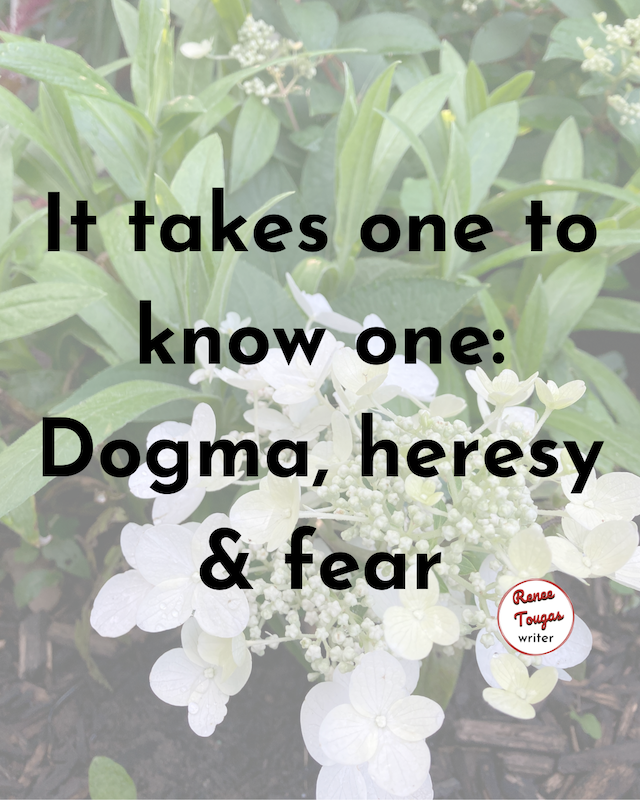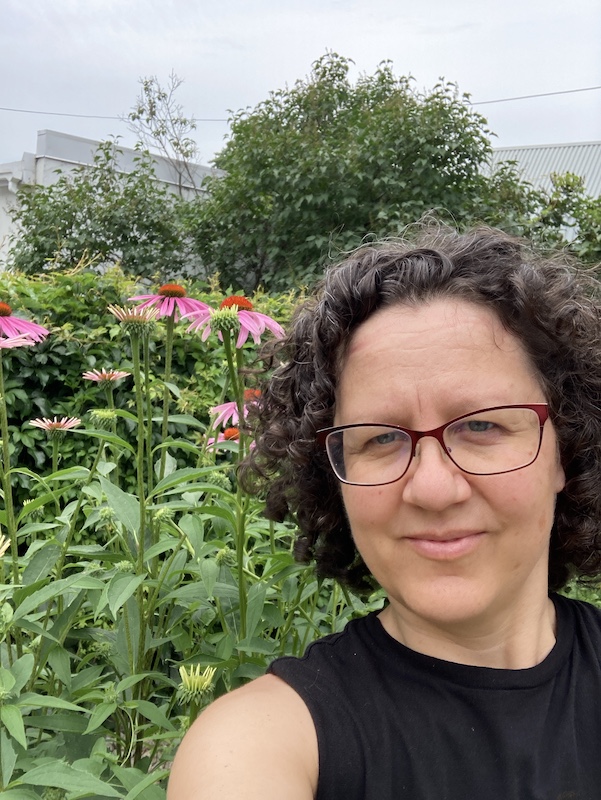Get posts by email
It takes one to know one: Dogma, heresy & fear
July 17, 2023
Welcome back to my political series. This is the sixth post in the Why have you become so political blog series.
↓ Audio recording of this essay ↓
And a video recording of this essay on YouTube.

My last post in this series, published fall 2022, explained my political orientation, as a complicated or nuanced leftie and how I got here from my conservative upbringing. I parsed the difference between left, liberal, and progressive. I brought in the voices (literally audio recordings) of cultural critics, medical doctors, journalists, philosophers, and scholars to support my conclusion that the pandemic, at least in Canada, provided a huge reveal of the authoritarianism of the left. And I talk about the disorientation this caused in my life.
I thought the next place to take the series was to discuss the ongoing manufacture of consent in society that primed us for the aggressively conventional-minded pandemic response.
But I realized that before I could talk about this, if in fact I do decide to go on to write about that, I needed to talk about dogma and heresy and how these tools of control extend well beyond the bounds of religious belief, where I used to think of them primarily residing.
“Religion” as adherence to a particular ideology, with doctrines, orthodoxy, iconography, and practices of belief does not only reside in what we commonly think of as religions (Christianity, Islam, Judaism, Sikhism, etc.). Identifying these impulses and practices operating in the supposedly a-religious culture-at-large has helped me understand this cultural moment.
(To be clear, understanding dogma, heresy, and what constitutes religion, do not form the entire picture or framework for understanding what’s happening in our culture and in our politics, but it’s a piece that helps put the puzzle together.)
One of the gifts of my own religious deconstruction is the ability to see religious fervor and behavior in the broader culture and in supposedly a-religious spaces, having already identified and worked to de-tangle myself from dogma, orthodoxy, and heresy in my own spiritual practice and beliefs.
It takes one to know one is an apt phrase for this experience.
In other words, it takes someone who used to believe and profess particular dogma to see it in other people, when they themselves may not even be able to recognize it.

Dogma
There are colloquial, philosophical, and theological ways of defining the terms dogma and heresy. These words have very particular meanings within the Catholic faith, for example.
I’m writing this at the broader cultural level. I’m not focusing on what these words mean within specific contexts, but what they mean in common, nonsectarian parlance.
Here is my definition of dogma for the purposes of this writing.
Dogma is a point of view or tenet put forth as authoritative that exists beyond debate and discussion. Unlike empirical scientific understanding which is always open to being proved wrong by new evidence, dogma asserts “this is how it is”, often appealing to an external authority. Basically, any idea that is incontestable to someone is dogma.
Like wikipedia says, “dogma in the broad sense is any belief held unquestioningly and with undefended certainty”.
So how is dogma different from belief?
Again, I’m going to keep this differentiation at the colloquial level.
For now I’m going to use the definitions from the wikidiff site.
“As nouns, the difference between belief and dogma is that belief is mental acceptance of a claim as likely true while dogma is an authoritative principle, belief or statement of opinion, especially one considered to be absolutely true regardless of evidence, or without evidence to support it.”
Also, from that same site, the definition of belief is, “faith or trust in the reality of something; often based upon one’s own reasoning, trust in a claim, desire of actuality, and/or evidence considered.”
The dogmas I have been most familiar with are religious, i.e.: doctrines claimed as infallible by religious authorities. In my Protestant experience, usually these dogmas were related to the Bible and how the Bible should be understood.
The religious teaching of my childhood was not “this is what we believe and there are other people whose beliefs are of equal value”. It was “this is authoritatively true” and the Bible was the evidence to back those claims. Maybe all religions are like this, but the religion of my childhood claimed “truth” more than “belief”, by which I mean beliefs were given as irrefutable.
To say “this is our belief” contains an explicit recognition there are other beliefs. To say “this is Truth” contends any other position is not-truth, therefore wrong or invalid.
The Bible was the literal word of God and so the beliefs we took from that text were beyond debate and discussion, they were simply True.
I imagine these truths were discussed and somewhat debated amongst the religious intellectuals of my faith but open-ended questioning and doubt were not valued or encouraged for the common believers. Sure you could ask questions, but only if you answered those questions with the approved apologetics texts which would eventually lead you back to the already agreed upon belief.
An aside about intellectualism in the faith of my childhood
Intellectualism and higher education in general were not valued and perhaps even suspect in my Protestant Charismatic Christian (Pentecostal) upbringing. Evangelicalism believes in a “spiritually empowered laity”1. In my Pentecostal upbringing one’s own experience of God through the baptism of the Holy Spirit was the fullest expression of the Christian experience. Which is why our church was called the “Full Gospel”.
This baptism of the Holy Spirit, the focus on individual salvation and holiness, and an emphasis on an empowered laity enabled the bypassing of education as equipping for leadership in the faith. Whereas other churches and religions valued higher education, the examples of leaders in my childhood faith, including my own relatives, were everyday folk with some Bible school training.
It’s true that I was a child 40 years ago and education and credentialism hadn’t grown to the place of cultural prominence they hold now. In other words, formal education was less important in general. Even so, the pursuit of a broad education, particularly the kind of liberal arts education that was the foundation for ministers of other branches of Christianity and within other religions, even at the time, was not esteemed or valued in the “experiential” and “the Bible is our authority” religion of my upbringing.2
My point of this diversion is to say intellectualism and formal education generally did not feature prominently in my formative religious experience. It’s fascinating to wonder if my own criticism of the elitism of formal education and my own high value on experiential learning developed in part because of a religious formation that emphasized and valued a direct and personal connection to God, and “spiritual knowing” that did not require mediation.
Bringing this back to dogma…
When I started questioning the faith I was raised in, it seemed to me that non-religious, or a-religious people were probably more educated, definitely more rational, and therefore less prone to dogma. I thought dogma and the defense of dogma was a weakness unique to traditionally religious people.
If we were talking in person right now, that last sentence would be followed by a hearty and sardonic laugh.
Humans are irrational, by nature, irrespective of whether they identify as religious. And dogma is definitely not the exclusive domain of traditional and established religions.

So now let's talk about heresy
I’m going to rely on the dictionary definition that Google pulled up for me.
Heresy is the “belief or opinion contrary to orthodox religious (especially Christian) doctrine.” And more generally, heresy “is an opinion profoundly at odds with what is generally accepted”.
Here is a further definition from Paul Graham’s essay “Heresy”. (While you’re visiting Paul’s site check out The Four Quadrants of Conformism for related material.)
A heresy is an opinion whose expression is treated like a crime — one that makes some people feel not merely that you’re mistaken, but that you should be punished. Indeed, their desire to see you punished is often stronger than it would be if you’d committed an actual crime.
The examples of this throughout the history of the Christian faith are too numerous to mention, witch trials and burnings come to mind immediately.
Again, I grew up familiar with the concept of heresy because of my religious upbringing. Stepping outside orthodoxy was heresy and although we didn’t use either word in the day-to-day parlance of our faith and life, it was very clear what kind of ideas and practices were representative of both.
Many of my own beliefs now would be heretical to my childhood faith. As in, my childhood self would be convinced I had moved to the wrong side of salvation.
My point here isn’t to parse and tease out all the evolutions in my own faith and religious understandings, or even to prove any particular ideas as right or wrong. My point is to say that my religious formation familiarized me with the concept of orthodox beliefs and accusations of heresy for those who exist outside that orthodoxy.
Again, I naively thought this adherence to ideology and beliefs; the historical, literal and figurative burning of witches; the labelling of people as clean or unclean; the admonition to “stay away from the ideas that person talks about”; the “we’re right and other worldviews are wrong” was a uniquely religious viewpoint and weakness.
Goodness gracious, I could not have been more wrong.
In deconstructing my faith I have sometimes been inaccurate in my criticisms of the Christian religion. Specifically, I wrongly believed that Christians and other religious people were uniquely close-minded and judgemental of difference. While non-religious people and “progressively”-oriented people had moved beyond that.
It wasn’t until I observed the response of progressives, liberals, and leftists (see this post for my definitions of these terms) during the pandemic that I fully woke up to the reality that dogmatism and heresy is a human thing, not a “religious” thing.
And more significantly I’ve come to see that the practice of religion itself, as a suite of beliefs and behaviors including: adherence to doctrine, group orthodoxy, the worship or elevation of something, iconography and symbolism, stories of truth and meaning, these are active and evident in those professing no religion at all.
That itself is not a problen for me. I think that to be human is to be religious.
The problem is that these a-religious religious zealots are ignorant of their dogma and invocations of heresy. At least religious people know they’re religious!
I did not leave one form of institutionalized religion just to join and be co-opted and coerced, through cancelling, shaming, and self-censoring, into another. I will not go there. I will not join.
Here is just a teensy sampling of the religious fervor of the “progressively-minded” during the pandemic.
The dehumanizing, othering, the “these people are irredeemables” messaging directed towards the unvaccinated. At least in the religion of my youth no one was irredeemable.
The accusations of heresy directed towards any person who dared ask a question that opened up doors to explorations that were off-script of the already agreed upon story. (Where have I seen that before?)
The accusations of heresy directed towards scientists (& others) who questioned the “just follow the science” drumbeat, when science is not something we follow (like a religion, ahem…) but a method to check for biases in our interpretations of the world.
That all of this, and so much more, went unchallenged and unquestioned, like the emperor’s new clothes, by those dedicated to keeping the populace informed (i.e.:journalists), was doubly disorienting.
An aside about science & modernity
At its core, science is a method for checking our biases, for testing them for truth. Our inherent biases cause us to make conclusions from observations all the time. However, the scientific method let’s us test our bias by forming a hypothesis based on our observations, and then designing experiments to test that hypothesis.
The philosopher Karl Popper argued also that science is falsifiable. Any evidence that contradicts an already established conclusion requires modification of that conclusion, or discarding it all together. If an idea is not falsifiable (i.e.: does not express the conditions under which the conclusions are no longer valid) it’s not scientific, it’s a belief.
Living your individual life according to bias and belief is one thing, we all do that. But the whole task of modernity has been, among other things, an attempt to use science to help us sort through bias and belief at the pluralistic cultural level. (The desire for, and dependence upon science is itself a kind of bias, but we’ll set that to the side for this writing.)
Questioning and eventually rejecting religion as the means to explain the world and guide our behavior, modernity was a time in which we used the scientific method to understand the world and create social norms. I say “we” in the global sense as this worldview has spread nearly everywhere through globalism and colonialism. Communities of people still exist who do not conform to this worldview but this is the worldview that underwrites the social, political, and economic structures for most of the world’s population, and certainly those reading this.
In its true practice, science is always open to question and disproving. It’s prefaced with “as we know and understand now… subject to data that disproves this”. To say otherwise moves science into the territory of belief.
Science is not dogma and can never be presented as such.
In a post-modern, or (maybe post-post-modern world?) we don’t all believe in the same story of meaning and so science has the potential, theoretically, to serve as a tool to come to shared understanding and hopefully action on some things that affect all of us. Unfortunately, science itself is losing its potential to be an unbiased authority because of ideological capture. But like I said earlier, the reliance on science is itself a kind of bias. Humans are inherently biased and ideological beings, therefore everything that comes from us will be imprinted with this, no matter how hard we try to scrub and expunge it.
My thinking is that it’s better to talk about all of this up front, talk about the hidden and implicit bias’ any time we’re talking about how we do life together. Get it on the table. Of course the problem is that most of us would identify (& believe) our bias’ as “truth”. And then we’re stuck back at dogma.
Getting back to the main story.
The ex-communication and expunging strategies of shaming, cancelling, and censoring that ran rampant through the pandemic and have infected the overall public discourse like Penicillium roqueforti in a round of Stilton, are the worst impulses of authoritarian religious fervor writ large.
Don’t ask questions. Pledge your allegiance. Wave the flag. Wear the t-shirt. Sign this statement. Repeat after me. Show us you’re a true believer. Hail your salute.
This is not a statement about whether these actions are right or wrong. It’s about people’s ignorance in recognizing them as related to authoritarian religious behavior and dogmatism.

Let's just call it what it is
Humans are religious. We worship (something). We have rituals of meaning. We experience mystery and wonder and we seek ways to explain it. Let’s call these “spiritual” impulses and then religion is the organization of these impulses into coherencies and replications.
I am deeply religious, in both the spiritual way and the organized way, finding meaning in the coherence and replication of a particular sacred text and story.
But unlike the “religious” religious, the “a-religious” religious, in the form of the dogmatic religion of my youth, don’t say “this is my religion” or “this is what I believe”, they say “this is truth”. Actually these days they say “this is my truth”. And where things get really interesting philosophically is where someone’s personal truth requires particular actions and performances from others. I.e.: my beliefs requires you to take this action, say this thing, repeat after me.
As defined earlier in this essay, dogma is a point of view or tenet put forth as authoritative that exists beyond debate and discussion. Unlike true scientific understanding which is always open to being proved wrong, dogma asserts “this is how it is”, often appealing to an authority.
We see dogmatism and the invocation of heresy in many of the current cultural issues. This invocation is not new, it’s maybe as old as humanity itself, but in our contemporary context its rise in left-of-center politics is disorienting for me.
Dogma and heresy are often associated with positions wanting to maintain the status quo of “this is how it’s always been”. To see “progressives” invoking and using dogma (you can’t question this idea) and heresy (we’ll expunge you if you do) to advance their moral imagination, shows the bankruptcy of their position and perhaps even of their vision.
Quoting Hannah Arendt, Iain McGilchrist in his Unherd Interview, calls this for what it is. Tyranny.
I would say that a civilisation cannot thrive if differing points of view cannot be heard. Hannah Arendt, one of the greatest philosophers of the last 100 years, who was herself a German Jew and experienced Nazism, said that: “Once something can’t be said, you’re already in a tyranny.” So, it is indisputable that we are all now living, in Britain, in 2023, in a tyranny, because there are people who say, “You can’t say these things and there will be terrible consequences if you do."
Going through the pandemic and living in this cultural post-post-modern moment where it feels like down is up and up is down has taught me many things. But one clear lesson has been our human fallibility to closed-minded thinking, group think, mob mentality, and tyranny. It’s terrifying.
Which brings me to my last topic of this essay: fear
I was taught to fear God’s judgement and that what a person believed or didn’t believe could send them to eternal damnation. Fear of falling outside of God’s love is a strong motivator. This is one type of socially-constructed fear, but there are many others, just as damaging.
We’re wired to respond to our body’s feelings of fear as a matter of survival. Evolutionarily-speaking our fear responses have served us well in getting our species this far.
Those who seek power over others, those who wish to control others, to sway decision making for ideological reasons use this against people. all. the. time. Over the ages many external, non-material (i.e.: purely ideological) sticks and carrots have been used to uphold in-group social norms, including the threat of hell and the promise of heaven.

Here’s what you need to know as I talk about fear.
I come to this conversation as a naturally anxious person in spite of my very cushy, privileged existence as an early 21st century North American, middle class woman.
I am easily alarmed and I feel ridiculous sometimes about the things that make me fearful and the situations that raise my anxiety. My anxiety waxes and wanes in its strength, it’s definitely conditional and circumstantial, triggered mostly by stress, but it is ever present.
I’m not going to put myself on the couch in this essay. I’m not going to analyze the source or discuss therapeutics or practices to manage anxiety. My point in talking about my own fear is to say I’m hyper-aware of it. I look at it and examine it often. And being well acquainted with my own anxiety has made me very conscious about how fear is wielded in families, in communities and other human social structures and institutions.
Motherhood was my invitation to a different way of being and motivating action, in myself and others. It invited me to live into Love, not fear.
Years ago I made a conscious decision to not parent, educate, or raise my children out of fear. This involves choosing trust, love, and relationship over control, fear, and “rightness”. I have not done this perfectly. It’s a practice and orientation, not a “one and done” situation. And I rely a lot on my non-anxious husband for perspective when I’m overcome by irrational fears, which happens often.
This choice has put me at odds with a coercive education system and many models of parenting. It puts me at odds with my own anxious tendencies.
For a long time it put me at odds with my own religion and meant I had to deconstruct it all to see if something remained at the core that would allow me to be a person of faith and live in love, not fear.
Funnily enough, the central character of the Christian story models exactly this. Phew, I could keep my religion and live by my values.
A brief digression about those values. My values which I seek to align with my religious practices and vice versa, were formed by the Christian religion’s emphasis on fundamental human worth and dignity, a presupposition that underwrites all facets of Enlightenment-inspired liberalism, which all of western culture is steeped in. In other words, that I even have the freedom to deconstruct my own religion is partly due to the fact that we’re swimming in the waters of a Christendom-built society and culture, that despite all its numerous failings and faults (and also, notable decline) spread the baseline belief in human dignity and freedom that underwrites all our institutions and is implicit in modern and post-modern values.
With that out of the way, let’s wrap this up.
Conclusion
Dogma, heresy, fear and tyranny - the pandemic surfaced some really ugly and difficult aspects of the human condition. Aspects that I had wrongly assumed we were “progressing” past as a species.
Our vulnerability to biological disease vectors, although definitely part of the revealing from the pandemic, may be the least of our worries.
There is a craving for certainty that underwrites dogma and heresy. The certainty of rightness. The desire to secure particular outcomes, for eg. Heaven. It sets us on a quest to establish the exact borders of truth and knowledge. Living dogmatically and calling heretic on those with different opinions is a way of delineating, or indicating the exact position of truth to avoid the discomfort and fear of uncertainty. What thing might be lurking there in the dark? In the unmapped territory?
Fear, dogma, and heresy build the case and become the bridge we walk across to dehumanize each other, to say, “you fall on the wrong side of the border”. And when we’ve put someone on the other side of the border, when we’ve removed their humanity, there is little standing in the way of perpetrating indefensible acts against them, as individuals or groups.
Sometimes these acts are perceived as for the good of the “other” and as a way to “re-humanize” them back into the group. Other times these acts are intended to destroy or expunge the other, as a way to rid the larger group, or the “correct group”, of defilement. Both of these are forms of redemptive violence, redeeming the individual or redeeming the whole via violence.
Whether we speak of witch-hunts, pogroms, Stalinist purges, Nazi death camps, slavery, genocide, or today’s campaigns of deplatforming and cancellation, dehumanization paves the way to remove the victims from society. Turning the power of dehumanization against those we see as the enemy may win a temporary victory, but it strengthens the field from which our current oppression arises. Eisenstein
What does this have to do with politics and a blog series about “becoming political”? I hope the connections are obvious, since dehumanization and its attendant redemptive violence (or maybe just violence) in the name of politicized dogma and heresy is commonplace.
Politics is how we manage our shared life. It encompasses ideas, vision, structures, and procedures beyond and deeper than “political” parties and the political spectrum. Where fear, dogma, and heresy influence our thinking we create tyrannies, we dehumanize and behave violently towards one another in our shared life together.
Lastly, I remind you that the whole reason I started writing a series to explain why “I’ve become so political” is because of the incredible disorientation of observing this dehumanization and violence of the last few years in unexpected places.
To quote Eisenstein again,
The time of pandemania has surfaced ugly aspects of the human condition that had not been easily visible to most people living in affluent parts of the world. It became obvious just how little progress we have made toward an enlightened society. Yet, it also clarified the nature of the trouble and therefore, where real progress might lie.

We are nearing the end of this series. Thank Goddess. I wrote the base ideas for this series last April. 17 months later I would really love to wrap this up. I originally intended to land this series with some thoughts, collected like herbs in a basket, around “where real progress might lie”. That capstone piece, working title: Power, Pathways, and Possibilities is drafted and I have hopes to publish it.
But the terrain between this post and that final one is still ambiguous. Because like I’ve said many times, these ideas are big and have taken me to the edge of what I understand and can articulate. And even when I feel I’ve acquired a nugget of understanding I know that what I don’t know far outweighs what I do, and so how the heck can I write anything?
How this series wraps up remains to be seen. And if you got this far (in this essay and in this series), Wow and Thanks.
Subscribe to my mailing list for free, to get these posts delivered directly to your inbox.
Footnotes:
- Anne Synder from The Whole Person Revolution Podcast episode: Evangelicalism: Movement or Subculture?
- If you geek on religion (especially Evangelicalism), education, and history like I do, I highly recommend this text from Tony Richie: An Evangelical/Pentecostal Approach to Interfaith Education for Seminarians and University Students. I am in agreement with Richie’s assessment that, “[w]hile ambivalence toward education, or even open suspicion, persists, many Pentecostals are not opposed to education in itself, only education that destroys faith or reduces dependence on the Holy Spirit.”
A litmus test for dogmatism.
In examining your own beliefs for dogmatism (& tyranny) and I recommend these six questions articulated by Megan Phelps-Roper in the last episode of her podcast The Witch Trials of J.K. Rowling.
Are you capable of entertaining real doubt about your beliefs? Or are you operating from a position of certainty?Can you articulate the evidence you would need to see in order to change your position? Or is your perspective unfalsifiable?
Can you articulate your opponents perspective in a way that they recognize? Or are you straw-manning?
Are you attacking ideas or attacking the people who hold them?
Are you willing to cut off close relationships with people who disagree with you, particularly over small points of contention?
Are you willing to use extraordinary means against people who disagree with you?
Part of Series
You can subscribe to comments on this article using this form.
If you have already commented on this article, you do not need to do this, as you were automatically subscribed.





